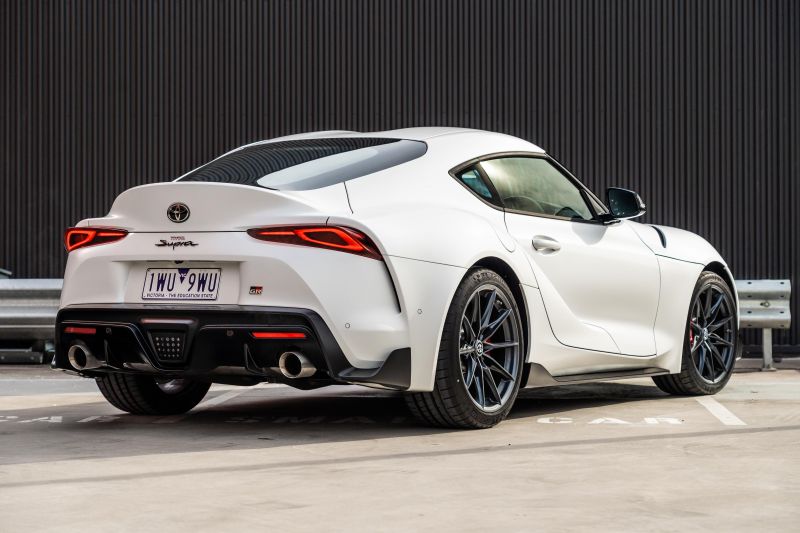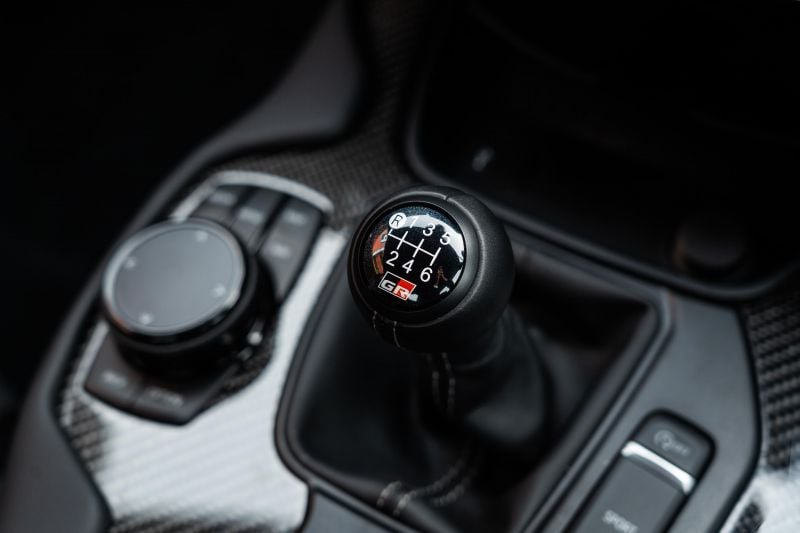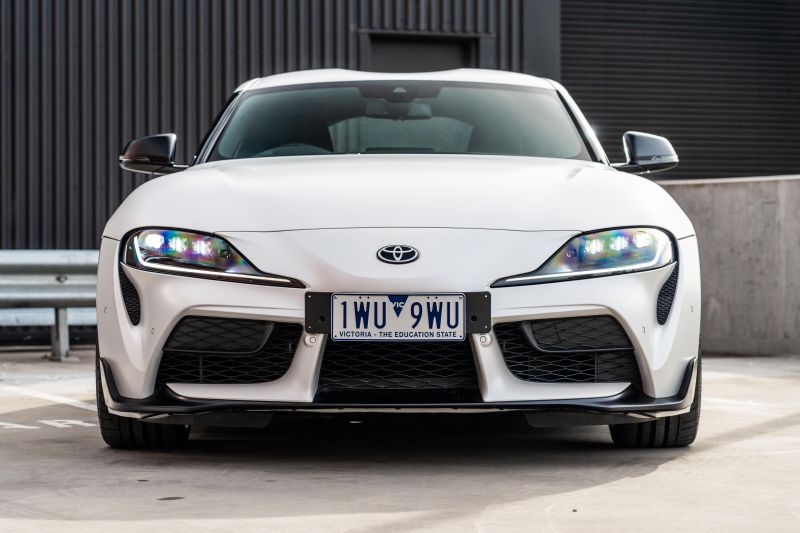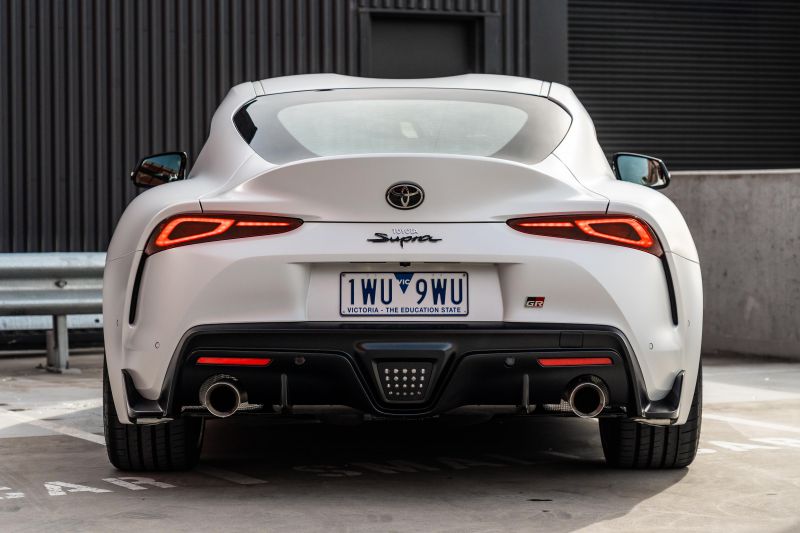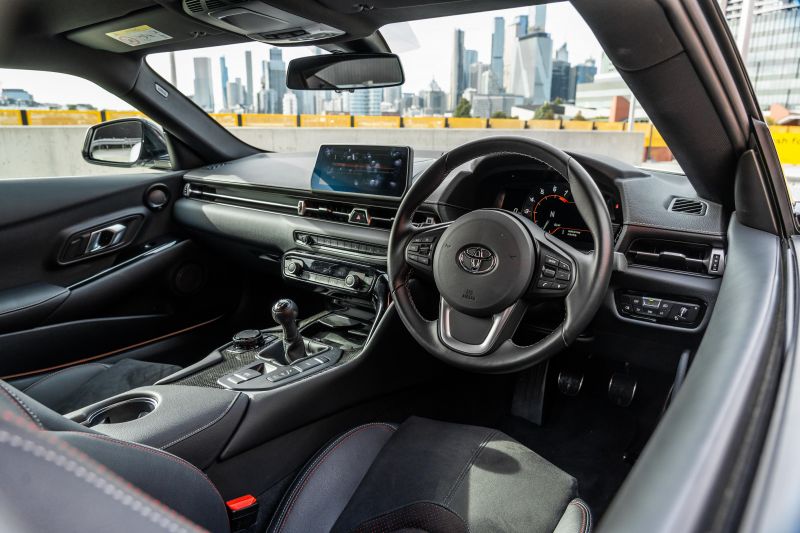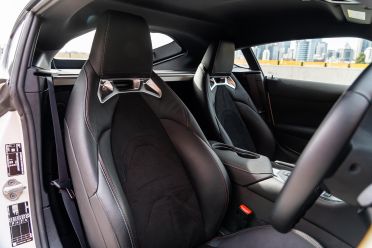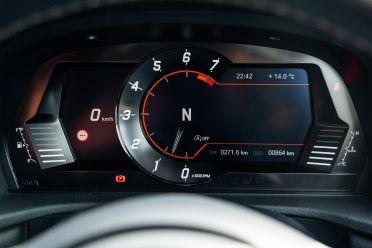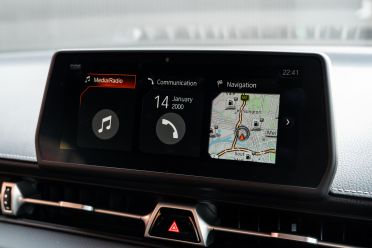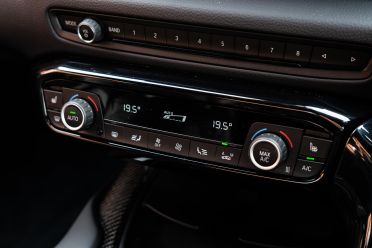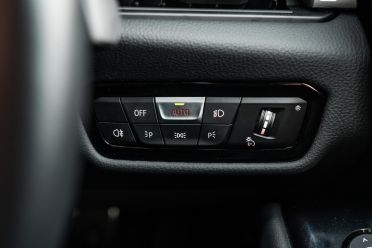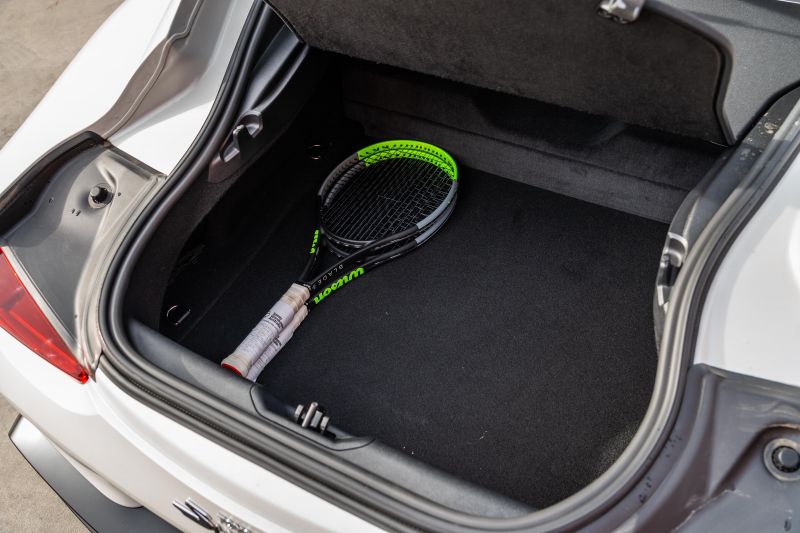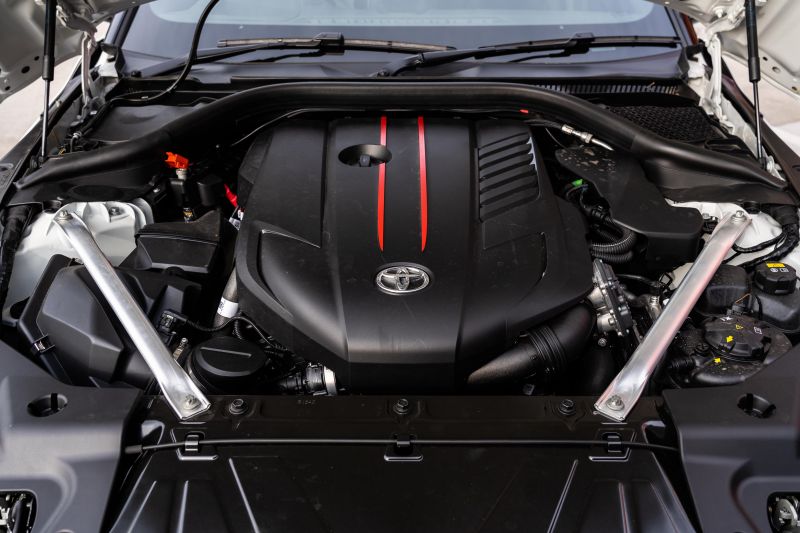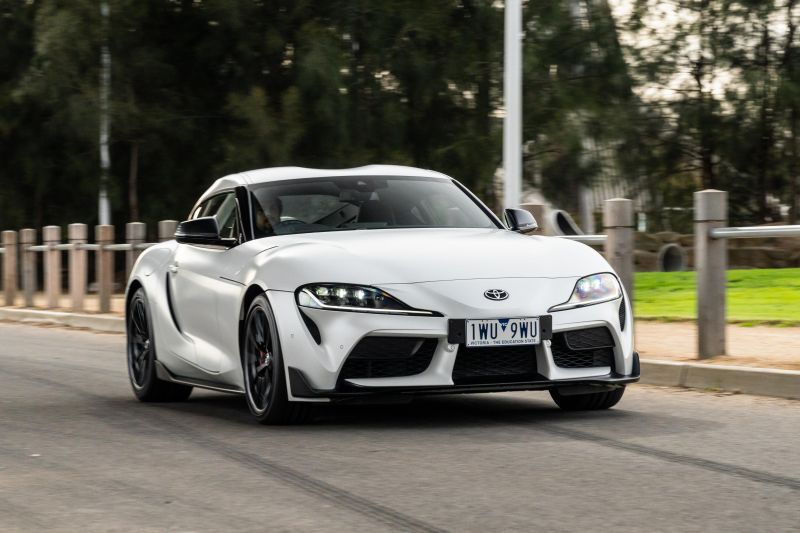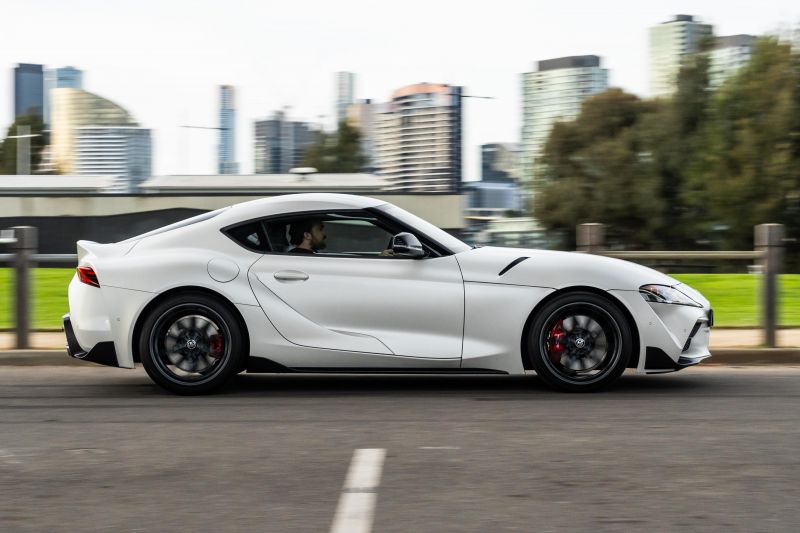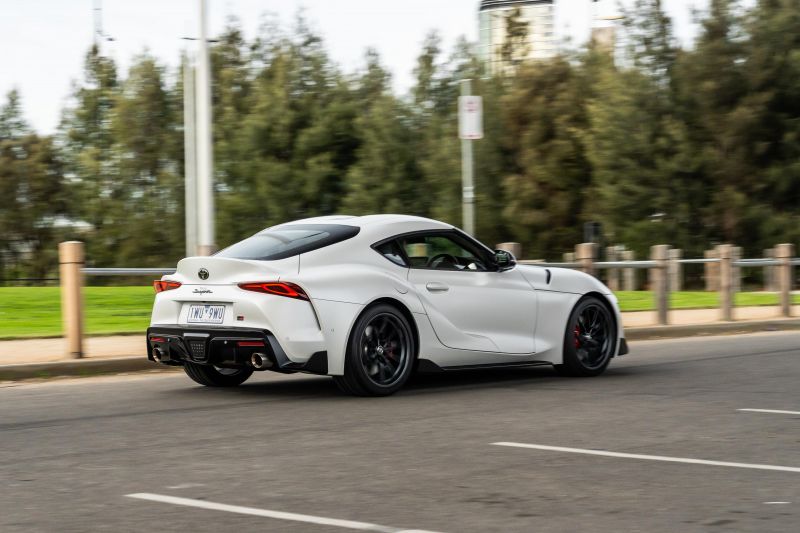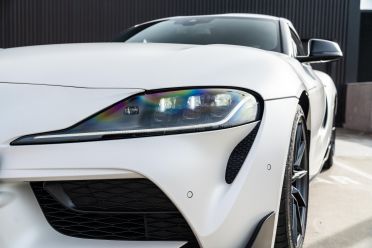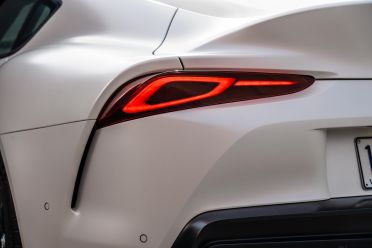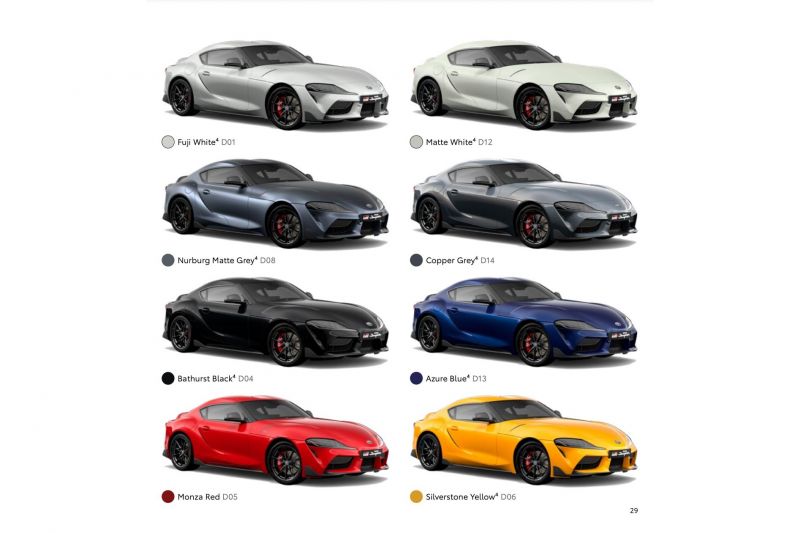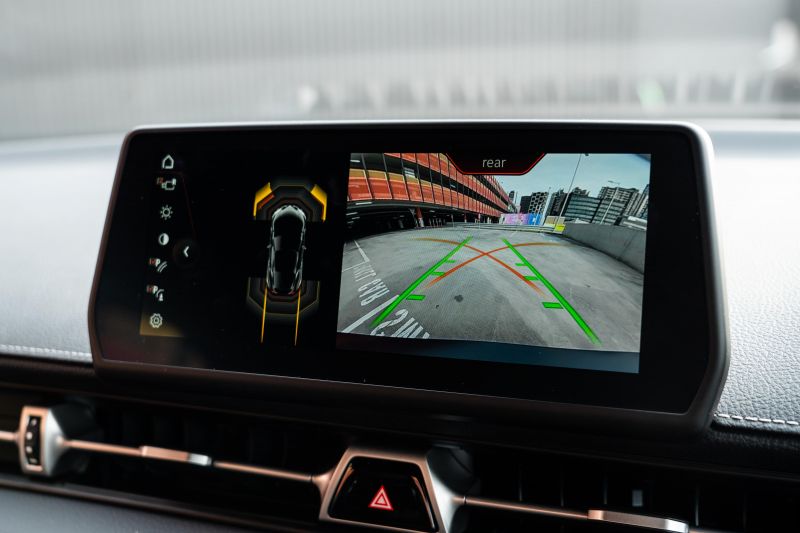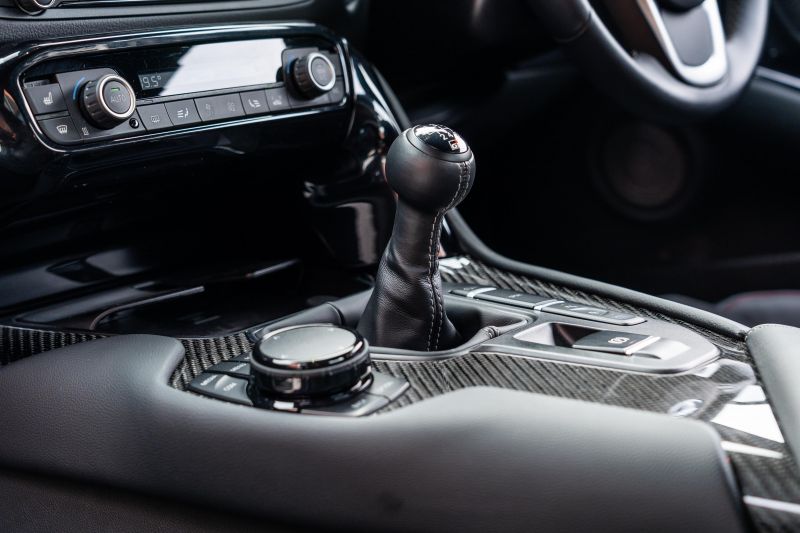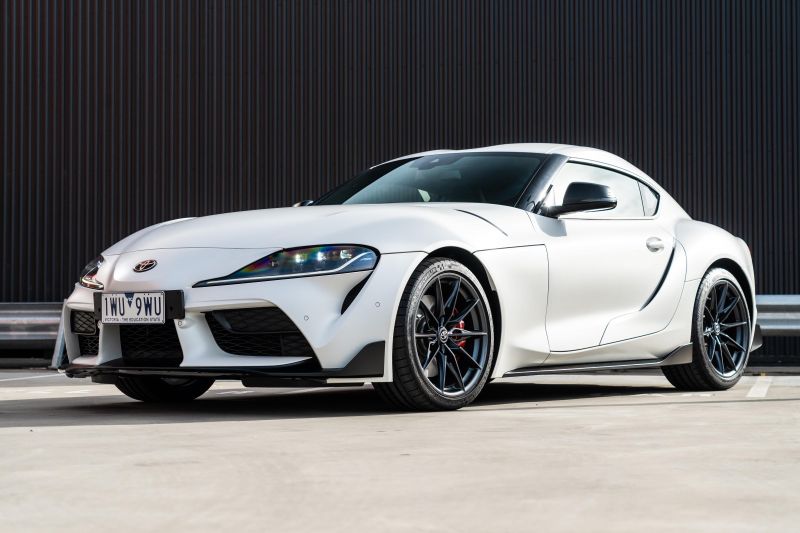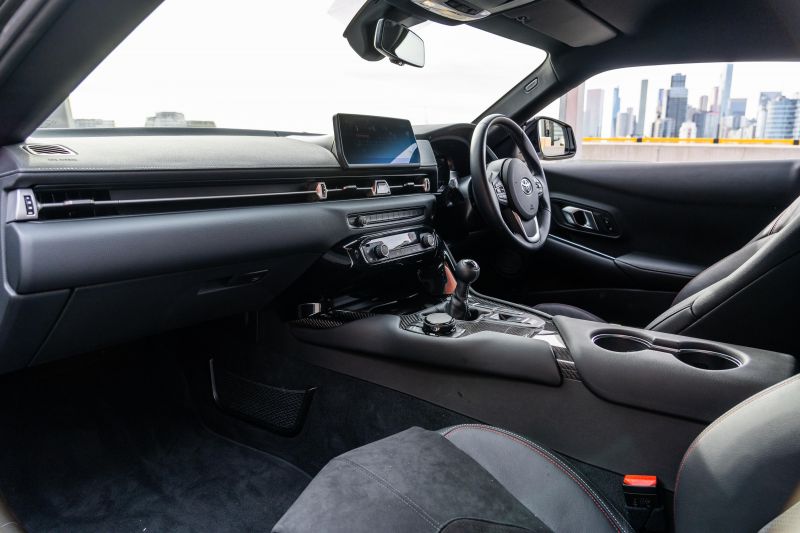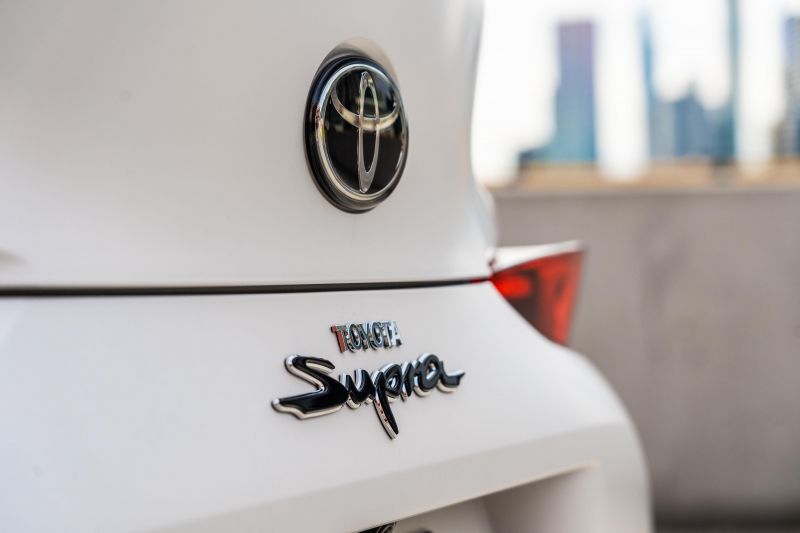The Toyota Supra is almost as storied in Japanese automotive lore as Nissan’s ‘Godzilla’ GT-R.
As a kid growing up with Gran Turismo and Fast and Furious, Japan’s great sports cars of the ’90s were things of worship for young car enthusiasts, well before any of us could learn how to drive.
Like the GT-R, the Supra had a lengthy hiatus after the fourth-gen A80 model went out of production in the early 2000s, leaving many wondering if Toyota would ever rejoin the sports car fold.
The 86 arrived in the early 2010s to much acclaim, itself a rebirth of the AE86 series of front-engined, rear-driven Corollas given cult status by Initial D, and rumours of a reborn Supra swirled for years.
Toyota revealed the FT-1 concept at the 2014 North American International motor show – and for years it was rumoured to be a preview for a new sports car that would revive the Supra nameplate.
We covered reports claiming the Supra was coming, and once the prototypes started hitting the Nurburgring it they were true. Fast forward to the 2019 Detroit motor show, and our prayers were answered with the debut of the final production model.
Several years on the Toyota GR Supra remains a rare head-turner on Australian roads, and is perhaps more exclusive and more desirable than the BMW Z4 with which it shares much of its DNA and engineering development with.
For 2023, Toyota Australia finally introduced a manual version of its flagship sports coupe – and that’s the version we have on test here in decked-out GTS specification.
Does the stick-shift fit the bill?
How much does the Toyota GR Supra cost?
You can get into a Supra for $87,380 in GT trim, with the six-speed manual and eight-speed auto available as no-cost options – though the GTS we have on test is $10,000 more at $97,380 plus on-road costs.
That’s about the same money BMW will charge you for a Z4 sDrive20i ($99,200), which is closely related to the Supra underneath the skin – though the base BMW has a turbo four-cylinder engine as opposed to the Toyota’s six. The Supra is available with the four-cylinder overseas, but not Down Under.
If you want a Z4 with the same engine as the Supra, you’ll need to drop $139,800 plus on-road costs for the M40i, which is also auto-only. Whether the BMW badge and a convertible roof are worth $40,000 is up to you.
You’re also in the same ballpark as the BMW M240i xDrive Coupe, which at $96,000 offers similar performance for similar money, and has all-wheel drive traction as well as a small second row of seating if you need it.
Elsewhere, the Nissan Z Nismo shapes up as a direct hometown rival at $94,000 – though Nissan Australia sold out its first allocation within an hour – while a base Porsche 718 Cayman is $122,000 before on-roads.
2023 Toyota Supra pricing:
- Toyota Supra GT 6MT/8AT: $87,380
- Toyota Supra GTS 6MT/8AT: $97,380
Prices exclude on-road costs
What is the Toyota GR Supra like on the inside?
The links to BMW are very strong inside, although the Supra borrows from older models.
Is that a bad thing? Not necessarily, but when you’re spending $100,000 on a Toyota co-developed with BMW it’s interesting the Japanese brand opted for the German marque’s previous-generation parts (or was forced to take them). It also means perceived build and material quality is top-notch.
The Supra runs a version of BMW’s iDrive 6 infotainment system, while the design and layout of the switchgear is very obviously from the German luxury brand – but more F30 3 Series rather than the G20 generation released around the same time as the Supra.
You get wireless Apple CarPlay, embedded satellite navigation, a reasonably 8.8-inch high-resolution touchscreen interface that continues to set a high standard for usability, and the BMW iDrive controller on the centre tunnel with surrounding buttons which is easy to use on the move.
Some of the chunkier black buttons and rubberised rotary controls aren’t as sleek as some of the stuff on the market today, but it’s all solid, nicely damped and ergonomically sound. Plus, the Supra has everything finished in gorgeous gloss carbon-fibre which is suitably racy and special for this car.
Ahead of the driver is another 8.8-inch display, which is one of the more unique designs in the Supra compared to its BMW equivalent.
The digital cluster is designed to look like a central rev counter dial flanked by information like a digital speedometer and trip computer. It’s not super customisable like some other displays we’ve seen at this end of the market, but it’s simple, legible and has its own flavour.
I like the sporty steering wheel, which again looks and feels like a BMW unit that’s had a Toyota hub tacked onto it. It’s not quite as chunky as the M Sport steering wheels of the time, but it feels nice and has well laid-out switchgear.
The other main driver touch point, at least in this particular car, is the manual shifter. The leather-trimmed unit has a nice GR plaque on top with the gearbox pattern on it. Unlike some of the BMW manuals I have trialled recently, the shift action in the Supra feels a bit more connected and accurate which inspires confidence – more on that later.
Being a sports car, storage and practicality aren’t high on the priority list, but the Supra at least offers some places to put your stuff.
Under the centre stack is a shelf which has a well-shaped slot to securely hold your phone in the wireless charger, and allows you to put something like a wallet on top.
There are also two cupholders mounted further back into the leather-lined centre armrest which shouldn’t get in the way of you shifting the manual unless you’re as lanky as Scott Collie – something like a Ford Mustang, meanwhile, won’t let you shift and hold a coffee in the cupholder in a very practical fashion.
You can also fit small bottles in the door bins, but not much else.
Under the Jaguar F-Type-style liftback is a 296-litre boot area, which isn’t massive but enough for some small suitcases or sports bags. I would say golf clubs would require some Tetris-style wedging work.
The Supra doesn’t carry a spare wheel of any kind, instead making do with a tyre repair kit only.
What’s under the bonnet?
A 3.0-litre turbocharged inline six sourced from BMW. Outputs are rated at 285kW (5800-6500rpm) and 500Nm (1800-5000rpm).
Our tester is fitted with the no-cost six-speed manual transmission, with a ZF eight-speed automatic also available for no extra cost. Drive is sent to the rear axle via a limited-slip differential.
When developing the manual transmission, Toyota worked with the BMW ZF casing and driveshaft, but went for an increased clutch diameter, strengthened the diaphragm spring, and shortened the final drive ratio.
It offers auto rev-matching, which you can turn off if you prefer heel-and-toeing yourself. Opting for the manual also shaves 22kg compared to the auto-equipped model.
Officially, Toyota quotes a 4.4-second sprint from 0-100km/h for the Supra manual, which is 0.3s slower than the automatic.
Combined fuel consumption is rated at 8.9 litres per 100km regardless of transmission, with the Supra featuring idle stop-start technology. The fuel tank is rated to hold 52 litres, with 95 RON premium unleaded recommended.
How does the Toyota GR Supra drive?
BMW’s 3.0-litre inline six is a sweet unit, and it fires up with a satisfyingly smooth burble every time.
The manual gearbox takes a bit of getting used to initially, but unlike the M2 manual I drove recently, you can get a hang of it to drive smoothly in traffic but also drive it harder without feeling clumsy.
Quickly I learned the short action from first into second required a proper press of the clutch right through, and you have to be quite decisive as you shift. Second into third can also be a little sticky, but after some time with the Supra and learning the intricacies of the shift action and clutch pedal, I felt much more connected.
You’ll also quickly realise how bloody fast this thing is. With 285kW and 500Nm on tap in a relatively light 1.5t body, the Supra shoots towards the horizon under hard throttle, feeling every bit as quick as its 4.3s 0-100 claim.
That silky smooth inline six really sings as it revs out, even in its normal setting. Putting it in Sport ups the ante with response and sound, but it also makes it a little too touchy for more mundane use.
I quite enjoyed driving this even in traffic. The shift and clutch became pretty easy in normal scenarios, and the ride and refinement is generally pretty good for daily use. There’s a cool factor about this matte white example that made me feel like a rockstar in traffic as well.
Find a twistier high-speed stretch of road and the Supra really comes into its own. It has a pointy front end with responsive steering, and heaps of grip from the staggered 255/35 front and 275/35 Michelin Pilot Super Sport tyres.
You can feel the rear scrabble about under hard throttle if you’re coming out of a corner or accelerating up a steep hill, but it’s such a linear and smooth operator that you have good feel and feedback as to what everything is doing so it doesn’t go pear-shaped – plus traction and stability control will keep you on the straight ahead, anyway.
Standard adaptive damping means you can have it in a more comfortable standard setting and firm things up for more spirited driving, but even then the Supra strikes a great balance between comfort and dynamics from the get-go.
The Supra’s rev-matching function received mixed reviews from the CarExpert team, and it was at times inconsistent as it requires you to fully depress the clutch pedal to work, and quickly, which meant sometimes it worked and other times it didn’t – you can just turn it off if you’re not a fan.
The Supra has a decent stash of assistance features too for the daily grind. Lane departure warning is a little old-school compared to some modern centring functions, though it works as it should.
The manual misses out on the auto’s adaptive cruise control but it does a good job at maintaining the set speed.
A reversing camera with front and rear sensors helps out with visibility when parking – the sculpted body and thick haunches can really get in the way – while rear cross-traffic alert gives you an extra set of eyes when pulling out of tight car parks.
The Supra’s autonomous emergency braking (AEB) system can also detect pedestrians and cyclists during the day time.
What do you get?
Supra GT highlights:
- 18-inch alloy wheels
- Adaptive LED headlights
- LED daytime running lights
- Adaptive suspension
- Limited-slip differential (LSD)
- 3-spoke leather-accented steering wheel
- Sport leather-accented seats
- Electrically-adjustable front seats
- Heated front seats
- 8.8-inch digital instrument cluster
- 8.8-inch touchscreen infotainment system
- Satellite navigation
- DAB+ radio
- Wireless Apple CarPlay
- Dual-zone climate control
- Smart entry, exit
- Normal, Sport drive modes
- Paddle shifters (8AT)
- Wireless phone charger
- Rain sensing wipers
- Sports brakes incl. red calipers
- Sports pedals
Supra GTS adds:
- 19-inch alloy wheels
- Head-up display
- 12-speaker JBL premium audio
Colours
Standard
- Monza Red
Premium: $575
- Fuji White
- Copper Grey
- Bathurst Black
- Azure Blue
- Silverstone Yellow
Matte: $2500
- Matte White
- Nurburg Matte Grey
Is the Toyota GR Supra safe?
The Toyota Supra hasn’t been crash-tested by ANCAP or Euro NCAP.
Standard safety features include:
- 7 airbags
- Autonomous emergency braking (AEB)
- Car-to-car
- Pedestrian, Cyclist detection (day)
- Adaptive cruise control (8AT)
- Cruise control (6MT)
- Lane departure warning
- Rear cross-traffic alert
- Parking sensors front, rear
- Reversing camera
How much does the Toyota GR Supra cost to run?
Toyota covers the Supra with a five-year, unlimited kilometre warranty, extended to seven for the driveline with regular servicing.
Scheduled maintenance is required every 12 months or 15,000 kilometres – whichever comes first. Toyota offers capped-price servicing for the first five years (60 months) or 75,000km.
Pricing is a little up, with both manual and automatic models quoting $415 a pop for each five visits. In total, you’ll be paying $2075 over the first five years. Not bad in the scheme of things compared to some premium marques, and pretty on par with BMW’s $2150 for the five-year Service Inclusive Basic package for the related Z4.
As for real-world fuel consumption, the Supra proved quite efficient in mixed driving, including peak-hour inner city commuting. The trip computer was showing an indicated 10.4L per 100km, which isn’t far off the combined claim of 8.9L/100km given the healthy portion of city commuting.
Idle stop/start definitely did its work in traffic, and for a vehicle with a big engine and big performance, it’s a pretty good result.
CarExpert’s Take on the Toyota GR Supra
I really didn’t want to give the Supra back.
Rarely do I fall for a car so hard, but the Supra manual has a charm about it that makes it feel special, and makes you feel special in the process. I couldn’t help but look back and smile every time I parked it, as well as smiling with glee every time I approached it to take it for a drive.
From the fantastic powertrain to the engagement that comes with a manual transmission, wrapped in the sculpted sheet metal inspired by a concept car, the Toyota GR Supra will turn heads. It punches above its weight in the performance stakes, too – it’s pretty much doing supercar numbers from a few years ago.
You’ll pay tens of thousands more for a BMW Z4 or Porsche 718 Cayman with similar performance levels, and the BMW 2 Series Coupe just doesn’t have the sex appeal of the Supra’s motorsport-inspired lines.
Then there’s the exclusivity factor – you don’t see many of these things driving around. Ignore the Toyota badge, it’s the Supra nameplate that will get people talking and not one person I spoke to tried to liken it to a Corolla or Camry.
I will say some dated BMW elements will not be favourable for tech heads like myself, and the sexy body also becomes a bit of a visibility issue. But, these are things you learn to live with, and I think the core Supra audience really doesn’t give a… you know what…
Like Godzilla, Mustang, and Corvette amongst others, the Supra name holds its own weight irrespective of its roots. Plus, you’re buying into one of the most iconic automotive legacies if you can get your hands on one.
Click the images for the full gallery





